This Hunger Action Month, Inter-Faith Food Shuttle is partnering with the Food Bank of Central and Eastern North Carolina to raise awareness and support for our shared goal of ending hunger in our community. We are so grateful for their partnership, but we also need your help to achieve this goal! Here are seven things you can do to join the fight against food insecurity this Hunger Action Month.
The Food Shuttle Teams Up With Wells Fargo for Free Food Distributions
September is Hunger Action Month
September is Hunger Action Month, Feeding America network’s nationwide awareness driver, designed to mobilize the public to take action on the issue of hunger. Inter-Faith Food Shuttle, a Feeding America network agency, is planning to join the annual month-long campaign to help bring attention to the reality of food insecurity in central North Carolina, and promote ways for individuals in the region to get involved in the movement to help end hunger
Corporate Partners Take Action Against Hunger
"Beet" Hunger with your own Backyard Garden!
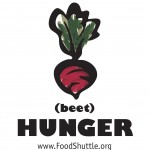 September is Hunger Action Month. Learn how one young woman who works with Inter-Faith Food Shuttle's gardening program in Parrish Manor is taking action to help BEET HUNGER in her community by teaching her neighbors how to grow fresh, healthy food in their own backyards.
Kiara Sanders has always loved to draw. Pencil and ink sketches of people are her favorite pursuits, but she credits gardening for giving her the confidence and the problem-solving skills required to pursue a college degree in art education. “Although art and gardening are different, they both require learning technical skills.”
September is Hunger Action Month. Learn how one young woman who works with Inter-Faith Food Shuttle's gardening program in Parrish Manor is taking action to help BEET HUNGER in her community by teaching her neighbors how to grow fresh, healthy food in their own backyards.
Kiara Sanders has always loved to draw. Pencil and ink sketches of people are her favorite pursuits, but she credits gardening for giving her the confidence and the problem-solving skills required to pursue a college degree in art education. “Although art and gardening are different, they both require learning technical skills.”
Kiara, 21, has lived with her family in Parrish Manor, a friendly, tree-lined low-income housing neighborhood in rural Wake county, for more than half her life. Growing up poor and with no car, her mother and grandmother depended on food stamps and family members to get enough to eat.
“We never knew when we might have access to a car, so we often got too much fresh food that would go bad before we had time to cook it all.”
In the past year, Kiara has participated in IFFS’s Urban Ag Program as a paid intern learning how to grow food in her neighborhood. Urban Ag educators Maurice Small and Lara Khalil teach a small cadre of part –time interns how to compost , build beds, mulch, and grow food as a means of feeding themselves. The goal of IFFS’s urban ag training is to chip away at the root causes of hunger: lack of access to fresh, healthy food and lack of income to buy food.
Beyond agricultural skills, Kiara says she has learned about leadership, “… how to function within a team; how to get organized; how to settle disputes and decide what to do when things don’t go as planned. “
By going door to door to drum up interest in the project, Kiara says she learned to overcome fear of social interaction, and to listen to what her neighbors needed.
“We learned that the community garden was too far away in the back of the property,” says Kiara. “ So we came up with the idea of backyard gardens because they are more convenient. We can spend our time teaching people who really are committed to doing the work, in their own backyards.”
Kiara and her fellow interns grew basil, peppers, cucumbers, and watermelon this summer in an area that used to be a “jungle of weeds” before the Urban Ag training began. In the fall, they plan to have their own backyard gardens sprouting winter crops. Naming the project “Raise the Roots”, they built a demonstration bed next to Parrish Manor’s centrally located office and have begun marketing the idea through signage, flyers, and newsletters. They hope their marketing efforts pay off by the spring with at least a dozen more neighbors joining the project.
“Not only can you eat better, you’ll learn responsibility and confidence by growing food. If I can turn a jungle of weeds into all this produce, it shows that with a team, I can do anything!”…even pursue that dream of getting a degree in art education!
You can help BEET hunger, too, by donating today, or you can help sustain programs like this one by becoming a monthly Ground Level Giver! Already have a backyard, community, or school garden? Consider donating some of what you grow through Plant a Row for the Hungry! Only by working together can we truly end hunger!
Squashing Hunger with Shopping Skills
September is Hunger Action Month, and we're featuring some of our wonderful volunteers who help us SQUASH hunger everyday. Check out how Aila Goforth helps SQUASH HUNGER with our Nutrition Education program, Cooking Matters at the Store.
“It blows my mind that 1 in 4 children in North Carolina is going hungry. I think it should blow everyone’s mind!”
So says Aila Goforth, a senior in NCSU’s Applied Nutrition program and a volunteer with IFFS Nutrition Education programs.
“I volunteer to get out of my comfort zone and engage with the world, to help the world understand that hunger exists and if everybody helps, we can make a difference.”
Aila leads Cooking Matters at the Store grocery store tours to teach families healthy nutrition on a budget. From reading nutrition labels to deciphering unit pricing, the Cooking Matters at the Store curriculum arms families with the practical knowledge to make little changes that add up to a big difference in health.
“The amount of sugar in cereal is often the big eye opener,” says Aila. “When mom sees that 12 grams of sugar in the average box of cereal equals 3 teaspoons of sugar, the light bulb goes off.”
Aila teaches families to compare the advertising on the box to what’s on the nutritional label. “It may say ‘healthy’ or ‘natural’, but the label shows it has 16 grams of fat.”
Because Aila works with low-income families, her eye is always on balancing what is healthy with what is affordable. That means buying a whole chicken, which is more economical than buying a chicken already cut up. Or buying milk on sale and freezing it to drink later.
Coming from a family that often needed help to stretch the budget, Aila knows first-hand what it’s like to go hungry or eat what’s filling rather than what’s healthy.
“If everyone learned just a little bit about hunger and health, and then helped just a little bit, we could solve this. There are so many ways to volunteer.”
 If Aila can do it, you can, too! Find out all the ways you can volunteer at www.FoodShuttle.org. Want to help out with grocery store tours like Aila? How about on October 24th for Food Day? We're hosting tours in Food Lions all across the greater triangle! Find out more here.
If Aila can do it, you can, too! Find out all the ways you can volunteer at www.FoodShuttle.org. Want to help out with grocery store tours like Aila? How about on October 24th for Food Day? We're hosting tours in Food Lions all across the greater triangle! Find out more here.
“Food Is Beautiful”
September is Hunger Action Month. Learn how Inter-Faith Food Shuttle volunteers and staff BEET HUNGER every day -- through programs like our Culinary Job Training Program -- and how YOU can join in the fight through Catering with a Cause!
No one knows better than Kitty Banks how food can lead to opportunity. Over a decade ago, she was struggling and alone, but IFFS’ Culinary Job Training Program was the second chance she needed. Twelve years later Chef Kitty leads IFFS’ nonprofit catering service, Catering with a Cause. As Kitty says,
“Food is everything… it’s like the olive branch, able to cross many bridges to simply allow me to connect to all different types of people. If a child is mad or having a bad day, I can make them smile with a simple grape. Food is beautiful.”
The Culinary Job Training Program is an eleven-week hands-on program taught by IFFS’ professional chefs and a social worker. Men and women with severe life challenges are prepared for careers in food service by learning in the Food Shuttle commercial kitchen. The program addresses the root causes of hunger by teaching skills for self-sufficiency. Some of the graduates become paid interns who staff Catering with a Cause. All profits are reinvested in the Culinary Job Training Program and other hunger relief programs. Catering with Cause specializes in box lunches, and lunch and dinner buffets, using purchased ingredients from local sources where possible, and fresh vegetables in season from the IFFS Teaching Farm. In additional to their delicious regular menu, they've even got a seasonal autumn specials menu out - check it out here!
Help us BEET HUNGER by placing your next catering order with Catering with a Cause. It’s a delicious way to support your community! Donate today or sustain our programs year round with monthly Ground Level Giving.
Opening the IFFS Teaching Farm: Goats on the Move
 September is Hunger Action Month. Learn how volunteers help us BEET HUNGER every day. Sustainable farms are key to a food secure and hunger-free future - find out below how you can volunteer on our Teaching Farm like Yvonne and help us beet hunger, too!
Yvonne Wagner opens the Inter-Faith Food Shuttle Teaching Farm every Tuesday morning. One of the tasks included in this volunteer job is moving the goats from their paddock to fresh pasture to graze. It can be a risky business, but it's all part of running a farm!
September is Hunger Action Month. Learn how volunteers help us BEET HUNGER every day. Sustainable farms are key to a food secure and hunger-free future - find out below how you can volunteer on our Teaching Farm like Yvonne and help us beet hunger, too!
Yvonne Wagner opens the Inter-Faith Food Shuttle Teaching Farm every Tuesday morning. One of the tasks included in this volunteer job is moving the goats from their paddock to fresh pasture to graze. It can be a risky business, but it's all part of running a farm!
What else is involved in opening the farm? Watch Yvonne and find out!
How else can you help out on the IFFS Teaching Farm and help us BEET HUNGER?
Opening the Farm:
What's involved? Opening the chicken coop, feeding the chicks, chickens, and goats, collecting eggs, checking water feeders and checking the aquaponics greenhouse. Opening the farm is a daily task that takes 45 mins and should happen within 15-30 minutes after sunrise.
Closing the Farm:
What's involved? Securely latching chickens inside their coops and checking the electric chicken fence. Closing the farm is a daily task taking 15 mins that should happen at sundown.
Farm Stand:
The farm stand at Dover Rd is open Thursday and Friday from 12-6 pm, and Saturday from 9am-1pm. Tasks include basic math, using a scale to weigh vegetables, interacting directly with customers, and keeping accurate records. Managing the farm stand happens on Thurs, Fri, and Sat, with volunteers working a 3 hour shift, either opening (11:45-3) or closing (3-6 pm), or anytime on Saturday from (9-1).
Harvesting Crew:
Every Thursday, Friday, and Saturday mornings we harvest for the farm stand from 8 am to 11:30 am. Tasks include using harvesting tools such as a knife, scissors, shovel, or digging fork; washing, sorting, and packaging produce and eggs; and delivering them to the farm stand across the street.
Field Preparation Crew:
The field preparation crew tasks include tilling and building rows, hoeing and raking weeds, spreading compost and fertilizer, mowing and weed-eating walkways, moving deer and chicken fences, and transplanting from the greenhouse. These are daily tasks and can be either a morning (9-12) or afternoon (1-4) work time (these times are guidelines, our volunteer coordinator Laura Todd (Volunteers@FoodShuttle.org) does specific time scheduling).
Composting Crew:
We need volunteers to help with picking up brewers mash from local breweries in downtown Raleigh. What's involved? Driving a big box truck, depositing brewers mash in compost area, building and turning existing compost piles, checking compost temperature, and driving the tractor. Eventually, we hope to pick up food-waste from area restaurants to incorporate into our compost at the farm -pickups are typically 1-3 times per week in the afternoon and take between about an 1.5 hours from pickup to drop-off and mixing.
Please note that all Volunteer Opportunities can be taught on the farm to the appropriate candidates. All are welcome! Contact Joshua@FoodShuttle.org for more info.
Culinary Graduates Squashing Hunger
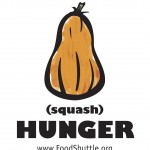 September is Hunger Action Month. We work to address the two root causes of hunger: lack of income and lack of access to enough good food. The Culinary Job Training Program (CJTP) helps SQUASH hunger by teaching skills for self-sufficiency and income generation. Participants learn by cooking up to 2000 nutritious meals each week for children, families, and individuals in need.
Friday , September 13th marked CJTP's 62nd graduation, as we celebrated the success and the journey of our three newest graduates: Kendra, Sharon, and John.
September is Hunger Action Month. We work to address the two root causes of hunger: lack of income and lack of access to enough good food. The Culinary Job Training Program (CJTP) helps SQUASH hunger by teaching skills for self-sufficiency and income generation. Participants learn by cooking up to 2000 nutritious meals each week for children, families, and individuals in need.
Friday , September 13th marked CJTP's 62nd graduation, as we celebrated the success and the journey of our three newest graduates: Kendra, Sharon, and John.
Despite life challenges, these three strong individuals persevered to make it through our intensive 11 week course that includes instruction in knife skills, equipment identification, and cooking terminology; hands-on cooking experience including cooking techniques, stocks, sauces, soups, salads, yeast breads, and quickbreads; ServSafe food safety and sanitation instruction, as well as life and employment skills, stress management, a sexual harassment seminar, and basic nutrition.
While gaining new skills and training under Training Chef Khaleel, Chef Terri, and our Social Worker Sharon, participants in the CJTP program not only prepare for a new career - they also help Inter-Faith Food Shuttle feed those in need, converting thousands of pounds of food weekly into hundreds of nutritious, well-balanced meals, which are then delivered to local soup kitchens and children's programs. In the words of the graduates:
Perseverance indeed was the word of the day at the celebration on Friday. Kendra, one of the graduates had actually begun the course last year, but she had fallen ill with pneumonia, had to be hospitalized, and was unable to complete the course. This year she returned, even more ready to learn - and on Friday, friends and family applauded and cheered as Chef Terri handed Kendra her certificate.
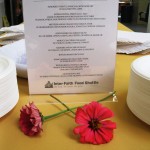 CJTP students come from all walks of life and background. As graduate Sharon said, "I'm proof that you're never too old to learn something new." IFFS's Culinary Job Training Program helps unemployed and underemployed individuals with life challenges do just that - learn a new skill for a new, self-sufficient future.
CJTP students come from all walks of life and background. As graduate Sharon said, "I'm proof that you're never too old to learn something new." IFFS's Culinary Job Training Program helps unemployed and underemployed individuals with life challenges do just that - learn a new skill for a new, self-sufficient future.
Each of the three graduates have interviews lined up - at Centerplate, Golden Corral, McGregor's Country Club, and the PNC Arena. Anyone in attendance can attest to the high quality of their work, as their final test in the program is the meal they prepare for the graduation luncheon. We can't wait to see them succeed!
To support proactive hunger-relief programs like this one, donate today, or help sustain them year-round by becoming a monthly Ground Level Giver - join us in the fight to SQUASH HUNGER!
Seed Saving and Season Extension: Farmers Share Ideas, Learn Together at Piedmont Biofarm
 September is Hunger Action Month. Check out one way we're BEETing HUNGER. The Collaborative Regional Alliance for Farmer Training (CRAFT) United Piedmont strengthens the local food system and local network of sustainable farmers -- a key component of a healthy, hunger-free future for our community!
On August 25th, over 30 beginning and established farmers, gardeners, homesteaders, farm interns, and farm-interested folks gathered at Piedmont Biofarm for CRAFT United Piedmont’s 3rd tour of the 2013 season. CRAFT United Piedmont is a farmer-to-farmer collaborative learning project where farmers and apprentices can learn from each other and build a stronger farming community.
September is Hunger Action Month. Check out one way we're BEETing HUNGER. The Collaborative Regional Alliance for Farmer Training (CRAFT) United Piedmont strengthens the local food system and local network of sustainable farmers -- a key component of a healthy, hunger-free future for our community!
On August 25th, over 30 beginning and established farmers, gardeners, homesteaders, farm interns, and farm-interested folks gathered at Piedmont Biofarm for CRAFT United Piedmont’s 3rd tour of the 2013 season. CRAFT United Piedmont is a farmer-to-farmer collaborative learning project where farmers and apprentices can learn from each other and build a stronger farming community.
At Piedmont Biofarm, Farmer Doug Jones and his production team grow a dazzling diversity of vegetables year-round, all while enriching soil fertility. The farm is especially known for its wide array of peppers and sweet potatoes. Along with on-farm seed-saving techniques and growing cool-weather crops through the summer, the farm is committed to sustainable production through a variety of other projects. The CRAFT-UP tour showcased the farm's cultivation of climate-specific varieties of vegetables by selective breeding. In recognition of his dedication to creative and responsible land use, Doug Jones was named 2009 Farmer of the Year by the Carolina Farm Stewardship Association.
Seed-Saving
Doug farmed for 27 years in northern New York state, and after moving to North Carolina, managed the student farm at Central Carolina Community College for 4 years. He decided to start Peidmont Biofarm to focus more on research and teaching.
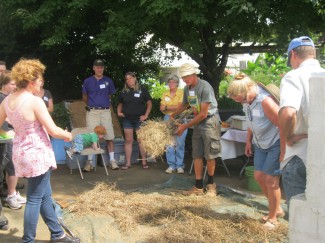
He currently has about 150 breeding lines of peppers he’s working on, focusing on breeding varieties that have all the flavor of hot peppers like habaneros, but without the heat. That way, people can eat more of them, benefiting more from the nutrition packed inside these brightly colored veggies. He also works to breed peppers that have the flavors of heirloom varieties, but the more reliable performance of hybrids. A breeding line becomes a “variety” when the line has stabilized and is ready for sale to seed companies.
Doug hopes to encourage more local seed saving, as currently most of popular organic seed companies are located in the Northeast.
Season Extension and Growing Cooler Weather Crops during Summer
Starting cooler-weather crops during summer gives farmers the advantage of having fall veggies for sale earlier than others in the market, and the veggies only sweeten as they mature into the cooler weather. However, as Doug described, each cooler-weather crop has an “Achilles heel” in warm weather, and Piedmont Biofarm works to identify those weak spots and overcome them on a crop-by-crop basis.
One of the main challenges for starting cooler-weather crops in summer is the danger of the summer heat and sun drying the soil out. If the soil is too dry, crusting on the surface can also be an issue, making it difficult for plants to germinate and break through the surface. To combat this, Piedmont Biofarm waters every day when it’s hot. Water can help cool the soil, but must be applied with care, as too much water can be a problem as well, causing fungal growth and damping off.
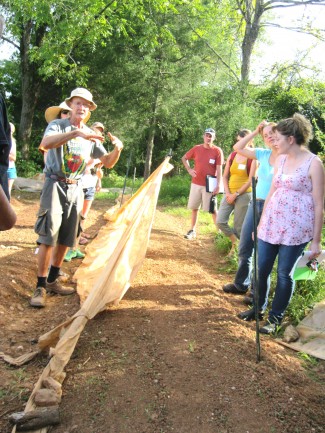 At Piedmont Biofarm, they utilize natural shade and create additional with shade with fabric to help keep the soil cooler and moist to start cooler-weather crops like lettuce and cilantro during the summer. These plants can’t take more than an 85 degree soil temperature without going dormant and need cooler temps to germinate.
At Piedmont Biofarm, they utilize natural shade and create additional with shade with fabric to help keep the soil cooler and moist to start cooler-weather crops like lettuce and cilantro during the summer. These plants can’t take more than an 85 degree soil temperature without going dormant and need cooler temps to germinate.
Another challenge for starting cooler weather crops during summer lies in the insect population of warmer weather. Mustard greens, for example, are fast germinating, but their Achilles heel is susceptibility to insect attacks. To remedy this, Doug uses insect-barrier grade row covers to keep flea beetles off.
Row covers can also act as insect control in more ways that one – not only can they act as barriers, keeping insects out, but the plastic row covers can “solarize” insect populations, killing larvae on plant and in soil with the heat generated beneath them. This practice of insect management keeps the pests from spreading to other areas of the farm, and it utilized after a row has been mostly harvested. Piedmont Biofarm often uses plastic row covers to solarize old bean crops.
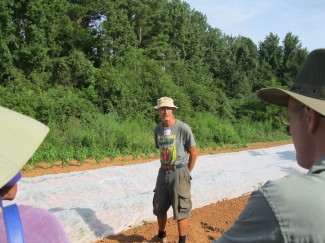 Plastic row covers can protect fall crops later into the season, offering both frost protection and more heat during the day to encourage faster growth, but in our sometimes erratic North Carolina climate, on a warmer fall day, crops can fry beneath them without ventilation.
Plastic row covers can protect fall crops later into the season, offering both frost protection and more heat during the day to encourage faster growth, but in our sometimes erratic North Carolina climate, on a warmer fall day, crops can fry beneath them without ventilation.
Doug is a self-proclaimed addict of the 10-day weather forecast and watches it closely to plan his planting and for when to cover or uncover crops. The hardiness of a plant can be softened by milder weather, but a mild shock can strengthen the plant’s defenses to subsequent frosts and low temperatures.
Shared Ideas, Shared Spaces
One of the great things about CRAFT is how groups like this can spark ideas for collaboration amongst local farmers – like a shared storage and/or curing facility to smaller farmers growing sweet potatoes in the region, one idea that was generated during the tour.
Sweet potatoes can’t take soil or storage below 50 degrees, and must be cured after harvest at around 85-90 degrees. They’re grown on much larger farms that concentrate on the crop in the eastern part of the state, but finding a good place to store and cure the tubers can be an issue for smaller scale, diversified growers.
Did you know sweet potato greens may help prevent prostate cancer? These plants are eaten primarily for the greens and vines in other cultures, rather than for the tuber, and Doug sells some of the greens he grows to a study that is tracking the effect of adding sweet potato greens to the diet of prostate cancer survivors.
More Research and Experimentation: Maximizing Genetics, Space, and Yield
Doug also likes to experiment with and utilize polycultures on his farm, especially during the winter to save space when growing under high and low tunnels. He plants quick maturing plants like radishes and turnips in between slow-maturing plants like senposai (an Asian collard green) that will need more space later to take advantage of the space and time.
He practices succession planting with crops like edamame that have shorter growing times, so the farm can have them available for harvest and sale for longer.
Currently, he is also experimenting with a type of corn from Peru to see if this later season variety that thrives with shorter days but produces large seeds and huge ears for dry corn can thrive here in North Carolina and be ready for harvest before the first frost.
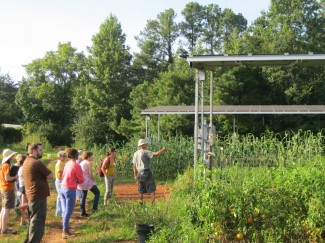
Another experiment in double-cropping, Doug is exploring how solar panels can still be used on agricultural lands without taking it out of production. Carefully determining the shifting shadows and shade created by the panels, he plants underneath them accordingly, as one would utilize sun in cold weather and shade in hot weather. Proving solar panels can co-exist with agriculture could encourage more people to install them.
Want to see more of Piedmont Biofarm or learn more about his peppers or seed-saving operations? Check out the Pittsboro Pepper Festival on Oct. 6th, a tour of his farm as part of the CFSA Sustainable Agriculture conference in November, or seed-saving workshops through the Abundance Foundation.
Want to attend the next CRAFT United Piedmont Farm Tour and Potluck? Learn about retrofitting a produce space for growing mushrooms, led by farmer Meredith Leight at Granite Springs Farm in Pittsboro. Learn more and register here.
You can help BEET HUNGER and support our agricultural training programs by donating today, or help sustain them year-round by becoming a monthly Ground-Level Giver! Or want to get your hands in the dirt, connect to where your food comes from, and help grow wholesome produce? Volunteer on our Teaching Farm!









